
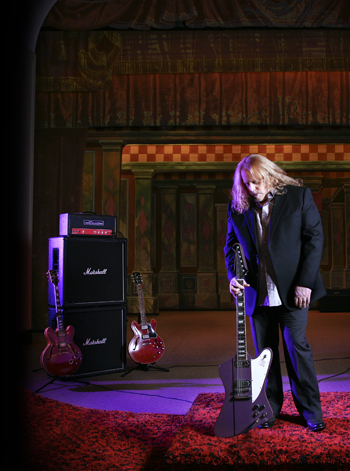
After two decades of playing in three of the greatest rock
groups in history, The Allman Brothers, The Dead and Gov't Mule,
Grammy award winning guitarist Warren Haynes has finally found
time to cut his second solo album.
But unlike his jam band history the new CD 'Man in Motion' is
a return to his southern soul roots. There's still plenty of
jamming and improv playing but as he tells GRTR's Pete Feenstra
it's the kind of soulful R&B and deep blues album he's wanted to
make ever since his solo debut 18 years ago.
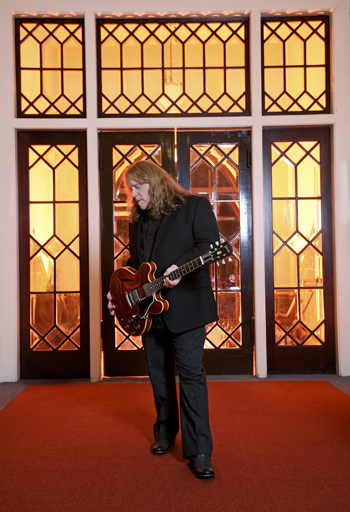
You were a singer first and didn't play guitar until you were
12, is this your musical career coming full circle
Yes it is in a way because I was mostly singing back then and
the music on this album is the kind of stuff that I liked before
rock & roll. It was soul music by people like James Brown,
Wilson Pickett, and Otis Redding and its music that goes way
back to my original influences.
Did you hear that music mainly from your folks at the time?
No, it came mainly from my two older brothers and because it
really was the music of the time it was very popular and you
heard it around you. It was music that was all part of the same
mix for me so the new record isn't that different in that
respect.
Do you feel you will have to drag your existing audience with
you to the soulful direction of the new record?
I hope not because I think a lot of them already like soul
music. I would think that anyone who is into Gov't Mule or The
Allman Brothers would probably are already be into that music,
though they might not be used to me singing it, but all the
elements come together on the new record.
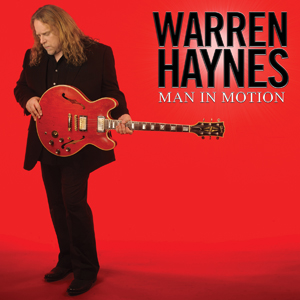
'Man In Motion' is a much more organic, soulful and song
oriented than say Gov't Mule. Was this an album you might not
have been able to make before this stage of your career?
Well firstly it is more organic just because of the way we
recorded it. We set up in the studio all facing each other and
we all played the songs as a real band, all at the same time. I
found the best way to capture music and particularly music that
is improvised is to take the old school approach.
It's also the way I did things with Gov't Mule and the Allman
Brothers band. I have recorded with outside producers who prefer
a different way of working but as regards my involvement that
has mainly been on other people's projects.
As regards making an album like this, before? Yeah I probably
couldn't have done it before now, not just because of who I was
back then, but also because of the way my career turned out.
This really has been the first opportunity to do it.
How did you put the band together?
I knew what I wanted from the start and I made a list of first
choices. It started with George Porter, Jr from The Meters and I
wanted Ivan Neville on keyboards and Ruthie (Foster) on vocals.
I especially wanted Raymond Webber on drums as he's my favourite
New Orleans drummer and then thought about the sax and Ron
(Holloway) was available and willing to do it. So I was lucky as
everyone I could possibly have wanted said they'd do it. In fact
the only person I didn't know before the session started was Ian
McLagan on second keyboard. He lives in Austin where we happened
to be recording and it was our producer who knew him better than
I did.
But for me it was important to know what Ivan thought, so we all
met and it worked real well and you can hear the results with
the two keyboards in each channel.
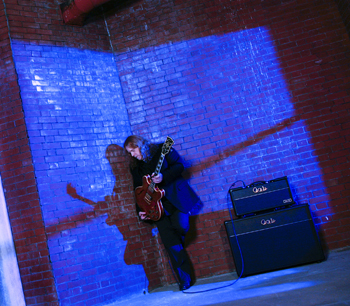
A lot of the songs have a jammed out 'in the moment' kind of
feel. Did you have to change your approach to recording this
album?
Not so much the approach of recording as paying particular
attention to the organic thing of responding to the musicians
you play with. I did have a different approach to the guitar for
example.
I went for a cleaner sound and I wanted that old school blues
sound, but it was just as important to choose the right
musicians to interpret the songs. So to a certain extent the
whole thing happened more organically.
Then we reached a point on some songs when we wondered about
keeping the jam section at the end or not. I was thinking that
some of our fans would like that and it reminds me of some of
the records from the late 60's that that had a part one and a
part two. Part one would be the single and part two would be the
B side and basically the jam.
And so if you put the two together I thought it might lead to
some kind of resurgence of interest in that kind of music and
that way of recording a band playing together in the studio.
Does that mean that you didn't pre plan many of the songs
then?
You're right. There wasn't much there when we met up. I
virtually showed the band what the songs were by playing them on
my guitar. So the rehearsals were really what we did in the
studio. We got it down and rolled the tape, old school style.
You've previously said that; “It's important to catch the
energy and emotion of music being made live by a group of great
musician”. Does that mean your original ideas become transformed
by the recording process?
Well the ideas come from the band as much as the way they are
recorded. I thought it was important to capture the moment, the
emotion of a song, but also a snapshot of the band at the time.
The idea was to cut an album in the same way as the classic soul
albums that influenced me. And the way they used to do it, by
playing together, jamming and improvising is what we've tried to
do on this record.
As regards writing the material, three of the songs - 'Your
Wildest Dream', 'Real Lonely Night; and 'Save Me' - came from a
long time ago, while the rest were written over the last 3
years.
'Save Me' acts as the perfect finish to an introspective
soulful album?
It was an old song that I always wanted to record and just never
got round to it.
|
...if I hadn't joined the Allman's in 1989 my solo
career might well have been different. I basically
inherited their audience, but I always loved the music
and it has become a big part of me and of who I am.
|
Was this a project that you had in mind for quite a long
time, especially since you haven't recorded solo for 18 years?
Well this was a different project to both Govt Mule and The
Allman Brothers. And if I hadn't joined the Allman's in 1989 my
solo career might well have been different. I basically
inherited their audience, but I always loved the music and it
has become a big part of me and of who I am. This record is
something that makes sense now but hasn't happened before just
because the opportunity was never there.
The title track of the new CD is called 'Man In Motion'. Is
that a reference to your non stop working career?
I guess so, though I'm not really pointing at my own work ethic
so much, as there are others who work much harder than me. But
I'm lucky as I enjoy my work and it's more to do with the idea
that I didn't want to rest on my laurels. Music is about
exploring, growing and changing and maybe that's reflected in
the title. And this is a time when I'm able to explore something
I wanted to do for a while.
On the soulful groove of 'The River's Gonna Rise' you explore
different tones, lots of wah wah, and an Albert King feel, with
big backing vocals. It's a song rich in texture, is that what
you intended?
Yeah it was. I had envisaged the voices of Ivan and Ruthie, and
I think this was the first song that the three of us actually
sang together and it turned out to be strong blend As regards
the Albert King feel to the guitar playing, I didn't actually
realise that side of things until we were actually recording.
We'd only played it on keyboards before and so what you hear at
the end is wholly down to the band's interpretation.
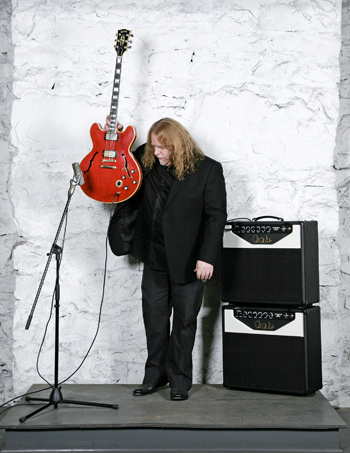
Was the idea of the William Bell cover of 'Every Day is a
Holiday' to anchor the album to its soulful roots? There's also
some great drumming on this track
William Bell and I became friends over 20 years ago. And we met
up a year before this record and he had always been on my wish
list as a possible producer of the record. Anyway we became
friends and I always loved that song and it stuck in my head.
The arrangement also seemed to fit the record as a whole, so we
just had to do it.
As regards the drumming, Raymond Webber is fantastic throughout
but the way it came out on that particular track was wholly due
to the way he listened to the song so deeply. His drumming
follows the guitar so closely its really great.
Some of your solo's on the CD sound like they could have come
from your days with The Dead?
Well I find that when I play with a cleaner sound I tend to play
more melodically, it's like my phrasing is more like a vocalist.
And with a band like this you make the most of the opportunity.
'Sick of My Shadow' is very funky and comes with a weird wah
wah sounding sax and a jammed out groove section. What were you
aiming for on that song?
Well we had the idea of trying the wah wah on the sax and
Holloway was totally open to the idea. I guess his musical
background gives you an idea of how adventurous he can be. He's
played with Root Boy Slim & The Sex Change Band as well as Dizzy
Gillespie. Basically he's a monster player and we traded licks,
I was playing my D'Angelico jazz guitar and he was playing some
weird stuff with the wah wah.
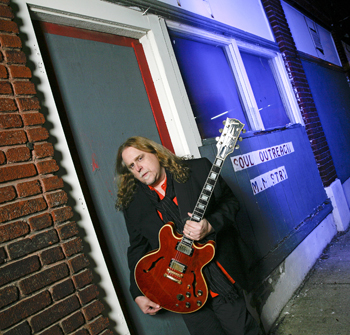
Do you use different guitars to search for different ones to
fit a song?
Well I use different guitars more for the feel of the record
rather than a specific song. For this record I tended to play
hollow bodied guitars rather than my usual Les Paul set up. 'Man
In Motion' is a record with many different sounds, in fact the
whole process was a nice way of exploring different sounds.
There's a some great sax and guitar sparring on 'Real Lonely
Nights' and its got a Robert Cray meets Memphis feel to it. Was
that your intention?
I guess it's got a bit of an Al Green feel to it to a certain
extent and it was another example of the band stretching out.
Again we wondered should we fade the track at the 4 minute mark
or let it run the whole way through to 7 minutes. But we thought
it might freshen things up by letting it run, even if it wasn't
necessarily a modern approach.
Ron actually overdubbed two sax parts; he improvised the
original line and then played a complimentary line to it which I
think gave the piece an Afro jazz feel, as well as bringing out
its poignancy. It was his idea of expanding the whole thing and
it really worked.
How long did the recording actually take?
After everyone was set up, we had 6 days actually recording with
the band and then added backing vocals, horns.
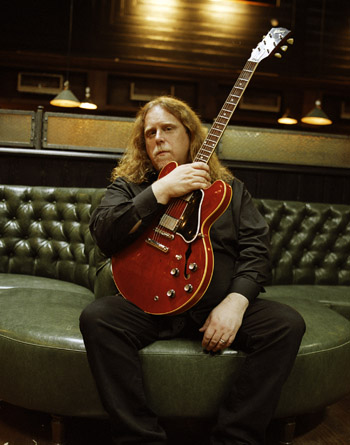
Going back to your early years as a musician, when did your
career really start?
I was very young when I started touring with David Allan Coe. I
was 19/20 years old and it was like being thrown into the lions
den. The gigs were anything from a big club to theatres and an
occasional arena, as within 2 years David had a number 2 single
in the States.
I was on a learning curve, though it was not a gig I would
normally pursue. But David introduced me to Greg Allman and
Dicky Betts as he knew I was an Allman Brothers fan. I think he
was trying to impress me. But anyway, the relationship was
established when I was young and I had about 3 years with him
before I headed to Nashville to become a session player. And it
was when I was in Nashville and I was making money that I
realised I really wasn't enjoying it much. For one thing I liked
my own songs better and I wanted to play them.
So at that point I had a solo career in mind, but then I got the
call from Dicky who wanted to start a new band and he wanted to
write with me. He was about to make a country record and I
thought the songs weren't really that good. I was hired to do
some backing vocals. But I was in the studio and I guess I
planted a seed as the bass player told him, 'I think we need to
hire this guy'.
So the country project was scrapped and it became a rock & roll
record. It was a tough decision for me as it meant putting my
solo career on the back burner. I was 26 years old when I joined
the Dicky Betts band and I lasted 3 years. I was 28 when I
started working on my first solo album but then the Allman
Brothers reformed and I couldn't think of a band from my past
that I'd rather be in. It was illuminating for me and it also
meant I could be in a band and still improvise.
It's been 18 years since your last solo album?
Yes 18 years and this really is the first opportunity I've had t
make another solo album. The Allman Brothers have just finished
a 3 week stint at the Beacon Theatre and apart from a couple of
possible things later in the year, they are scaling down their
touring at present.
Gov't Mule have just spent the last 15/16 months touring behind
the last album 'By A Thread', and we've been working solidly
since 1994.So this really is the right time. But the new record
is a band project and we will be touring that in pretty much
every market, the States, Europe, Australia and maybe Japan.
Interview © April
2011 Pete Feenstra
Photography: Stewart
O'Shields
Album review
 |
Print this page in printer-friendly format |
 |
Tell a friend about this page |
|








